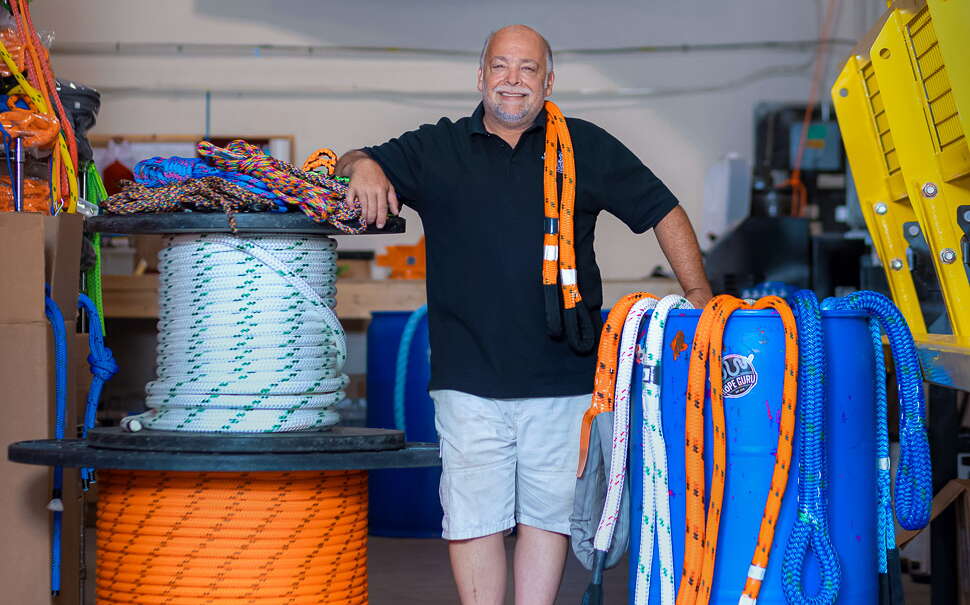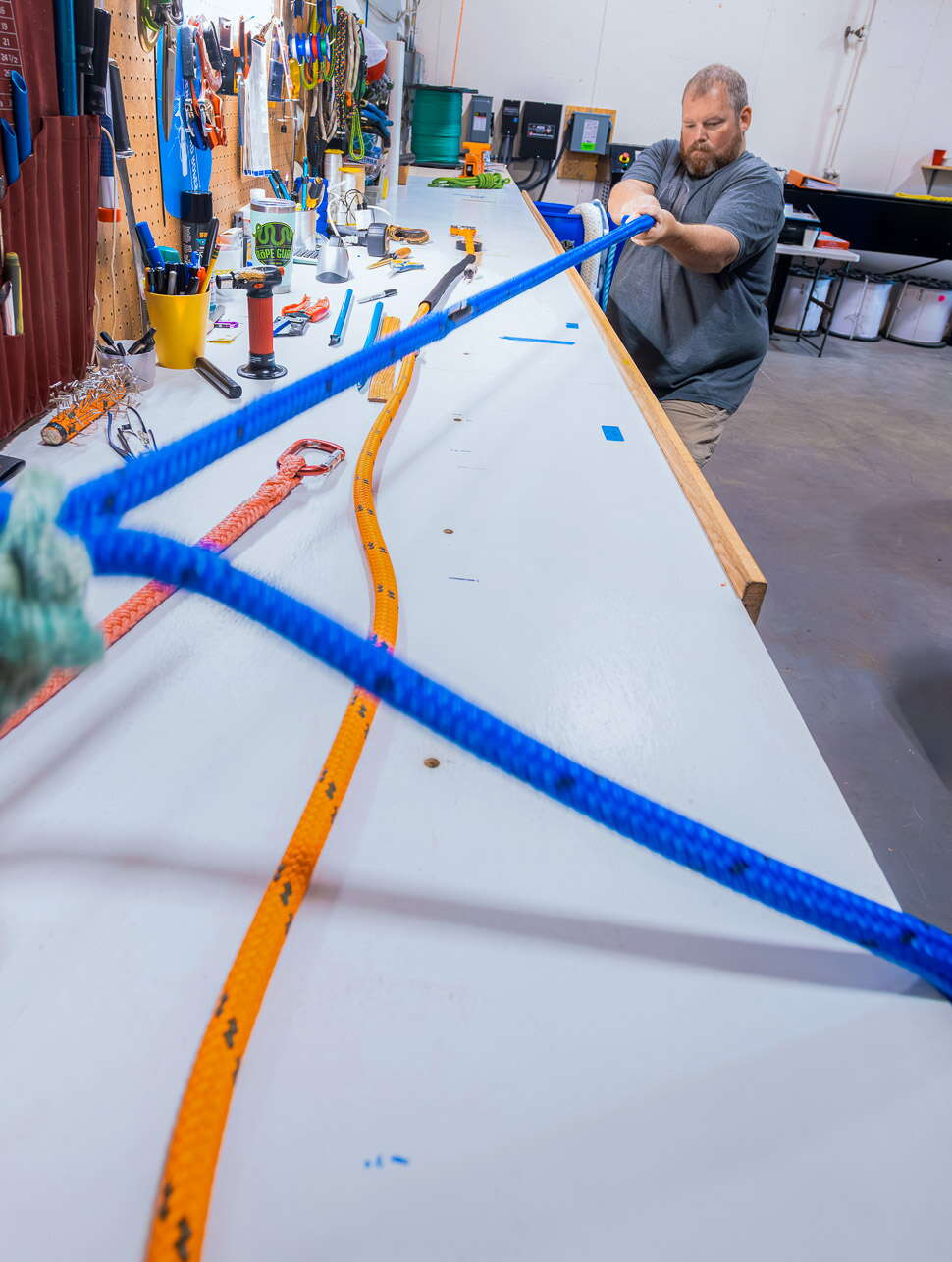
These guys know rope: The Rope Guru finds success in a niche market

Sales have more than doubled every year since Jamie Goddard started his rope-splicing company, topping $1 million in 2023. Not too shabby for a business he started in his home garage with a pingpong table for a work bench.
The Rope Guru is no longer located in Goddard’s garage, and the pingpong table is long gone. Today, he and one employee work in South Portland out of a two-bay industrial garage with 18-foot ceilings and plenty of room to work and store huge spools of rope for their business.
Goddard and his work partner, Joe Crowley, know rope inside and out. Between them, they previously worked at Yale Cordage in Saco for 35 years. Now they take Yale Cordage rope of all types and make custom rope products of all sizes and shapes to meet the needs of hundreds of customers in Maine and across the country.
“It’s a pretty niche market,” Goddard says. “We buy Yale Cordage’s rope in bulk and turn it into stuff. We make rope tools out of rope. The uses are unlimited.”
A background in rope
Goddard worked at Yale Cordage, a leading synthetic rope manufacturer, for nearly 20 years. As vice president of sales, he spent a lot of time on the road across the country as well as Europe, the United Kingdom, West Africa and Singapore.
But looking for a change and wanting to have more time to watch his daughter’s college field hockey games, he left Yale Cordage in 2019 and explored new opportunities.
He didn’t stray far from what he knew — rope — deciding there was a need for a rope-splicing company that could make custom rope products suitable for things like lifting huge sections of Navy destroyers, raising electrical transformers to the tops of utility poles, or simply climbing trees.
Rope isn’t a flashy product, and most people don’t give much thought to its multitude of uses. But rope is so much more than just clothes lines and sailing lines, and is used in numerous industries — electric utilities, tree-cutting, commercial marine, mining, oil exploration, pleasure boating, military and more.
After starting the Rope Guru in the fall of 2019 in his home garage in Westbrook, Goddard called upon Crowley, who was a rope-splicing expert from his 16 years at Yale Cordage. They had rope delivered to the garage and used a simple elevator system to hoist barrel loads of it through a hole in the garage ceiling to a room up above. That’s where Crowley made spliced rope products, the first ones coming on a ping-pong table.
As the owner, Goddard manages the business — sales, accounting, marketing and the like — while Crowley makes the end products. They have three major markets they sell to: electric utilities, heavy marine and arborists.
Customers
For the electric utility market, they sell rope products to companies that work on electric utilities, such as On Target Utility Services, for things like lifting transformers to the tops of poles or pulling poles out of the ground and resetting them.
For the heavy marine market, the ropes are used by tugboats, barges, salvage and other work vessels, or places like General Dynamics Bath Iron Works and Portsmouth Naval Shipyard that need extremely strong rope to lift heavy ship parts and machinery. BIW recently bought four rope slings, each with a carrying capacity of 337,000 pounds. With its huge crane, BIW can use the rope slings together to lift ship sections weighing more than a million pounds.
Tree companies typically use the spliced rope products for climbing trees or setting tree branches to the ground after they are cut.
The Rope Guru has also supplied products for space tourism, the U.S. military, and offshore oceanographic expeditions. Goddard’s even supplied spliced rope for dog leashes, horse leads and saddle hunting, where bow hunters sit in a saddle-like harness hanging out of a tree. If and when huge wind turbines are built and installed in the Gulf of Maine in the coming decade, Goddard hopes to supply them with Rope Guru rope products.
As business increased, Rope Guru outgrew the home garage and moved to an industrial space near the Maine Mall. The firm now operates out of a 2,000-square-foot, two-bay garage in a nondescript aluminum-sided building. Their company van sits in the parking lot, the Rope Guru logo on the side and license plates that read “Splice.”
Between their time at Yale Cordage and the Rope Guru, Goddard and Crowley have nearly 50 years in the rope industry. Talk shop with them and you can hear their passion as they talk about single-braided and double-braided, coated and uncoated, floating and non-floating rope.
Rope can be stronger than steel and the priciest type — “big boy rope,” as they call it — sells for up to $40 a foot. Products can range from just a few feet long to 25,000-foot pieces of rope with splices at each end used for electrical transmission lines.
It’s that expertise that draws customers such as Ryan Collet, a project manager with Cianbro Corp. who is working on the Portsmouth Naval Shipyard’s multiyear drydock modernization project in Kittery. The drydocks are fabricated in pieces at Cianbro’s Brewer facility and assembled at the shipyard.
For the project, Collet orders a variety of lines, primarily synthetic mooring lines for barges, from Rope Guru. Other Cianbro divisions also order their specialized rope products from Goddard, he says.
“There are two main reasons we use Jamie,” Collet says. “One, he has a tremendous amount of horsepower and industry knowledge packed into a small little shop. The team is next-level in terms of their knowledge. They know their industry and their market inside and out”
Furthermore, they never say they can’t do something. “That word doesn’t exist in their shop,” he says. “Whether I’m calling for something simple or relatively technical, they’ll make it happen. That’s hard to find.”
Parker Poole, owner of Determination Marine in Portland, buys his tow lines and other products from Goddard for his four marine towing and salvage vessels. Goddard was in the commercial fishing and fishing supply industries before he got into rope, and that experience is invaluable for him to thoroughly recognize Poole’s needs.
“With his background, he really understands our business and what we’re trying to do,” Poole says. “He’ll recommend the proper materials and products for us to do what we’re doing well.”
The Rope Guru’s space is packed full of large spools and cardboard boxes of rope in a rainbow of colors: orange, green, blue, yellow and even a style called confetti, which looks like the colors of a kaleidoscope.

Handy with the marlinspike
There are no manufacturing machines here for splicing — Goddard does it all by hand or, in some cases, uses a sewing machine. Goddard’s work table has an assortment of splicing tools, the most important of which is called a fid, a tubular metal device used in the splicing process. Other tools include scissors, measuring tapes and a leather “sailor’s palm,” which Goddard wears on his right hand to push large needles through rope.
When ordering spliced rope products, some customers say they want the strongest rope that the Rope Guru sells. But to make the right end product, Crowley needs to know more than that.
“‘What do you need it for?’ is 100% the most important question,” Crowley says.
Five years in, annual sales are in seven figures and continue to grow, Goddard says. With the phones ringing, the emails coming in and orders plentiful, the company is no longer in the startup stage.
“We’ve established ourselves,” Goddard says. “We’re full steam ahead. Not bad for two guys in a garage.”










0 Comments